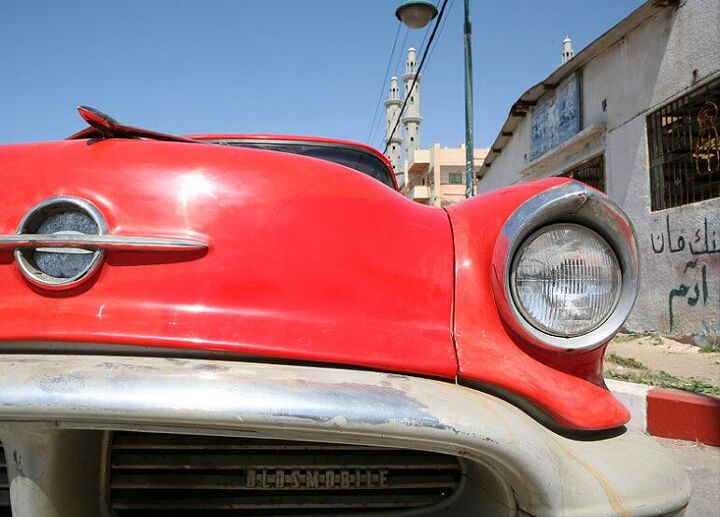The Curbside Classics Of The Gaza Strip
It’s a curious coincidence of history that the most anti-American parts of the globe are so dependent on old American cars. Havana is the classic example of this, and its still-rolling examples of classic American cars have become photographic icons, simultaneously representing both the failures of the communist government and the excesses of the preceding (but long-gone) American-backed regime. Another example of history written in the automotive landscape comes to us today from The BBC, which hosts a slideshow of cars from the Gaza Strip.
Mahfouz Caberetti is like any other classic car nut: he’s deeply proud of his still-running, classic Oldsmobile, and he gains intense satisfaction from wrestling with the wiring on his 1961 Mercedes. Unlike western car enthusiasts though, he must reckon with an Israeli blockade of Gaza, which prevents him from obtaining the spare parts he needs to keep his impressive collection of old iron running. And keeping these old cars running is more than just a hobby for Caberetti. Gazans young and old live under intense pressure and hopelessness, he says. Fixing old cars gives residents, especially teenagers, an escape from their 140 square-mile pressure cooker; it takes their minds off the constant stress of their situation. Though the travails of life in Gaza might be hard for American car nuts to fully understand, this escape into the simple pleasure of working on old machinery is a universal coping mechanism, crossing all lines of race, class and culture. And this rare point of common enthusiasm reveals our differences to be much smaller than we might otherwise imagine. In short, classic cars have succeeded in building cross-cultural bridges where 40 years of political negotiation have failed. That’s something every car nut should be extremely proud of. [Make sure to check out the slideshow, complete with commentary from Caberetti at The BBC’s website, Hat Tip: reader Ron Lason]
More by Edward Niedermeyer
Latest Car Reviews
Read moreLatest Product Reviews
Read moreRecent Comments
- Kjhkjlhkjhkljh kljhjkhjklhkjh A prelude is a bad idea. There is already Acura with all the weird sport trims. This will not make back it's R&D money.
- Analoggrotto I don't see a red car here, how blazing stupid are you people?
- Redapple2 Love the wheels
- Redapple2 Good luck to them. They used to make great cars. 510. 240Z, Sentra SE-R. Maxima. Frontier.
- Joe65688619 Under Ghosn they went through the same short-term bottom-line thinking that GM did in the 80s/90s, and they have not recovered say, to their heyday in the 50s and 60s in terms of market share and innovation. Poor design decisions (a CVT in their front-wheel drive "4-Door Sports Car", model overlap in a poorly performing segment (they never needed the Altima AND the Maxima...what they needed was one vehicle with different drivetrain, including hybrid, to compete with the Accord/Camry, and decontenting their vehicles: My 2012 QX56 (I know, not a Nissan, but the same holds for the Armada) had power rear windows in the cargo area that could vent, a glass hatch on the back door that could be opened separate from the whole liftgate (in such a tall vehicle, kinda essential if you have it in a garage and want to load the trunk without having to open the garage door to make room for the lift gate), a nice driver's side folding armrest, and a few other quality-of-life details absent from my 2018 QX80. In a competitive market this attention to detai is can be the differentiator that sell cars. Now they are caught in the middle of the market, competing more with Hyundai and Kia and selling discounted vehicles near the same price points, but losing money on them. They invested also invested a lot in niche platforms. The Leaf was one of the first full EVs, but never really evolved. They misjudged the market - luxury EVs are selling, small budget models not so much. Variable compression engines offering little in terms of real-world power or tech, let a lot of complexity that is leading to higher failure rates. Aside from the Z and GT-R (low volume models), not much forced induction (whether your a fan or not, look at what Honda did with the CR-V and Acura RDX - same chassis, slap a turbo on it, make it nicer inside, and now you can sell it as a semi-premium brand with higher markup). That said, I do believe they retain the technical and engineering capability to do far better. About time management realized they need to make smarter investments and understand their markets better.






































Comments
Join the conversation
Ingvar +1
It looks like this topic is too heated for the conversation to stay car-centered. No real surprise there. In the interests of preventing a flame war, I'm going to close comments now. We have a good smattering of diverse viewpoints so far, and we've all learned the most important lesson of all: the bigger the problem, the less talking about it seems to help. Maybe we should just watch this and sing along instead.